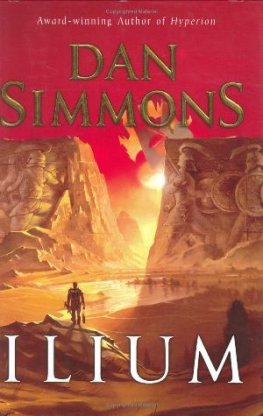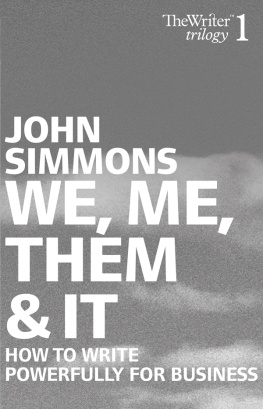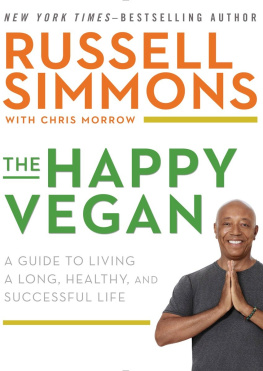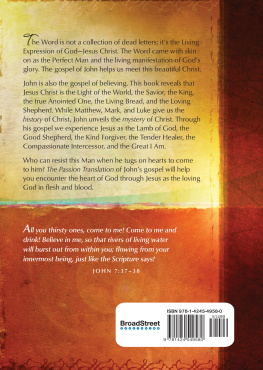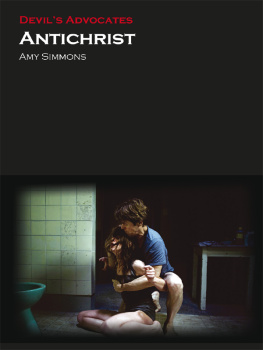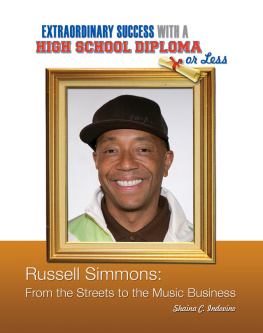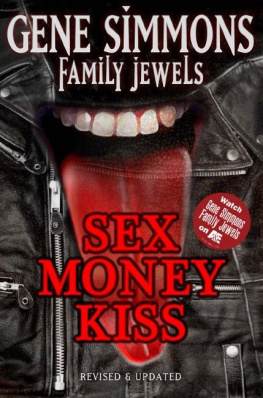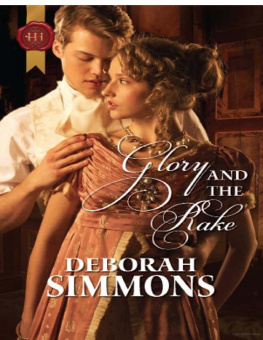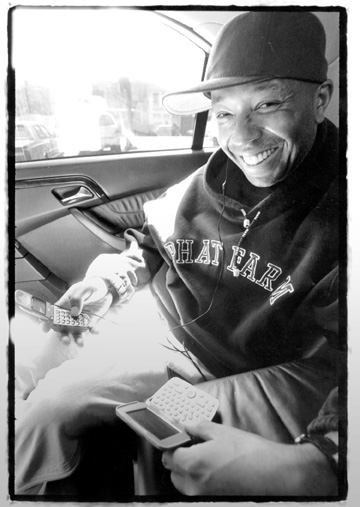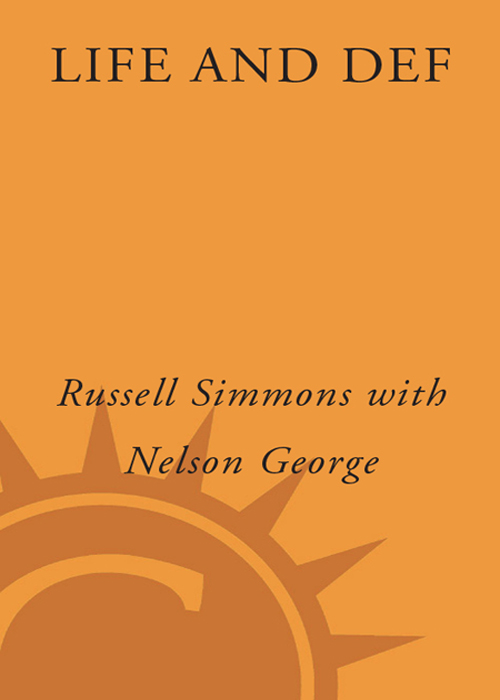
LIFE AND DEF
SEX, DRUGS,
MONEY,
AND GOD
Russell Simmons
with Nelson George

crown publishers
new york
CONTENTS
This book is dedicated to my wife, Kimora Lee, and my daughter, Ming Lee.
It is additionally dedicated to my father, to the memory of my mother,
to my deeply artistic brothers Danny and Rev. Run, and to the entire extended Simmons family.
RWS
LIFE and DEF
Introduction
When I was sixteen years old I almost killed somebody. His street name was Red, which hed earned for his reddish yellow complexion and his nasty, devilish temper. Red had robbed me on 205th Street, which in 1973 was the drug supermarket of my Hollis, Queens, neighborhood. To support my taste for flashy clothes, I had been selling herb on 205th Street, just a few blocks from where my family lived.
Being robbed while selling drugs is an occupational hazard. And there was no embarrassment in being ripped off by Redsticking up dealers on 205th Street was one of his criminal specialties. Still, there was a lingering question among my drug-dealing peers: If Russell sees Red, whats he gonna do? More than a question, it was a challengeone Id have no choice but to answer, one way or another.
Well, the answer came two weeks after Red robbed me. He came back on the block, apparently in search of his next victim. But before Red could make a move, we spotted him, and all the dealers started chasing him. We ran after Red for two or three blocks before a gang of us cornered him in the backyard of a single-family home. One of my niggas threw him down. A couple of the dealers sucker-punched him. And then, as Red struggled, somebody handed me a gun. Let that nigga have it, someone said to me. It was the first (and only) time Ive held a gun with the intention to shoot. I must have looked ready to bust a cap in him, because suddenly Red broke free of the three guys holding him and started climbing the backyard fence. Everything slowed down for menow I was in the middle of one of those unexpected, scary, life-or-death moments. I held up the .45, aimed at Reds back and fired. My bullet sailed right over his head. The last I saw of Red were his feet swinging over the wall. I can still hear the voices of the dealers running through my head and feel the heat from the gun in my hand. Its a feeling Ive never forgotten. I used to boast to all my drug-dealing homies that Id just missed Reds ass and if I got another chance, I wouldve went up in him. But in my heart I knew missing Red was the best thing I ever did. The truth was that kid was just running toward a bullet anyway. Two weeks later Red and his brother were both killed in a botched liquor store robbery. I guess the owner was a better shot than me.
Sounds like a lyric from a rap by Slick Rick or Chuck D, right? Nah, it wasnt a song, it was my life. But its the kind of real-life story that has inspired hip-hops storytellers for over twenty years. That hip-hop embraces tales like minestories of decisions and danger with deep moral and emotional consequencesis one of the reasons its grown so popular and Ive had one of the greatest jobs in the world.
My life has largely been about promoting the anger, style, aggression and attitude of urban America to a worldwide audience. I have helped sell the culture of hip-hop by identifying, nurturing and promoting artistsrappers, comics, designerswho can take life-defining moments like my confrontation with Red and turn them into commercial products that, at their highest level, become objects of art. Instead of becoming a low-level criminal with a thick jacket of felonies and gunplay, Ive taken the entrepreneurial energy I was putting into drugs and created a business that didnt even exist a generation ago. There were no rap stars when I was a teenager. There were no movies starring rappers or clothing lines bearing their names or, for that matter, books written by people involved with them. With the help of many I built the business of hip-hop from the ground up to a multibillion-dollar industry. There was no long-term vision then. We were all just making it up as we went along. But over time I developed a sense that this culture offered opportunities for economic, social and artistic growth like no other aspect of African-American culture.
I dont expect everyone to agree with my views. In fact, Im sure some readers will be hostile to the idea that hip-hop is a culture at all. I know aspects of the music, the fashion, the language and the politics of hip-hop offend many people. To those of you who feel that way, I just ask you to be open to hearing my story. To those of you who feel hip-hop in your souls, who love it as much as I do, kick back and chill with me. Im just gonna tell you what Ive seen, what Ive experienced and what Ive done, as honestly as possible. This is my storya tale of life and def.
PART 1
HOLLIS
TO
HOLLY
WOOD
COLD
GETTIN PAID
There have always been two types of black businesses in this country. First, there are those like Johnson Publications or Essence Communications (or black hair care or cosmetics companies), which cater to black consumers and work that niche for all its worth. Ebony and Essence, which are institutions in the black community, exist solely to target black consumers, draw revenue predominantly from the ad budgets of white corporations and portray a middle-class black version of American reality.
Then theres the Motown model. Berry Gordy labeled his company the Sound of Young America. Gordy was a visionary who saw that black culture, as expressed through the music his company created, was just as viable and important culturallyand commerciallyas anything in this country. Motown sold black pop music, written and performed by blacks, for consumption by all Americans regardless of their color.
My philosophy takes a little from both, yet differs fundamentally from them. Unlike Ebony or Essence, my audience is not limited by race. My core audience, my hip-hop audience, is black and white, Asian and Hispanicanyone who totally identifies with and lives in the culture. Those are my peeps.
And unlike Motown, I dont believe in catering to the so-called mainstream by altering your look or slang or music. I see hip-hop culture as the new American mainstream. We dont change for you; you adapt to us. Thats what has made Def Jam Records, Def Comedy Jam and Phat Farm, to name a few of my ventures, commercially successful and influential. And that is the central philosophy that has driven my career.
WHAT IS
HIP-HOP?
I guess I should start with my definition of hip-hop. To me, hip-hop is modern mainstream young urban American culture. I know theres a lot of ideas there, but hip-hops impact is as broad as that description suggests. Like rock and roll, blues and jazz, hip-hop is primarily a musical form. But unlike those forms of black American music, hip-hop is more expansive in the ways it manifests itself, and as a result, its impact is wider. The ideas of hip-hop are spread not just through music, but in fashion, movies, television, advertising, dancing, slang and attitude.
The beauty of hip-hop, and a key to its longevity, is that within the culture there is a lot of flexibility. So Run-D.M.C. and A Tribe Called Quest and N.W.A and Mary J. Blige and Luther Campbell and the Beastie Boys can all wear different clothes, use different slang and have a different kind of cultural significance. Yet all are recognizable as being part of hip-hop. I believe hip-hop is an attitude, one that can be nonverbal as well as eloquent. It communicates aspiration and frustration, community and aggression, creativity and street reality, style and substance. It is not rigid, nor is it easy to sum up in one sentence or even one book. Simply put, when you are in a hip-hop environment, you know it; it has a feel that is tangible and cannot be mistaken for anything else.
Next page

